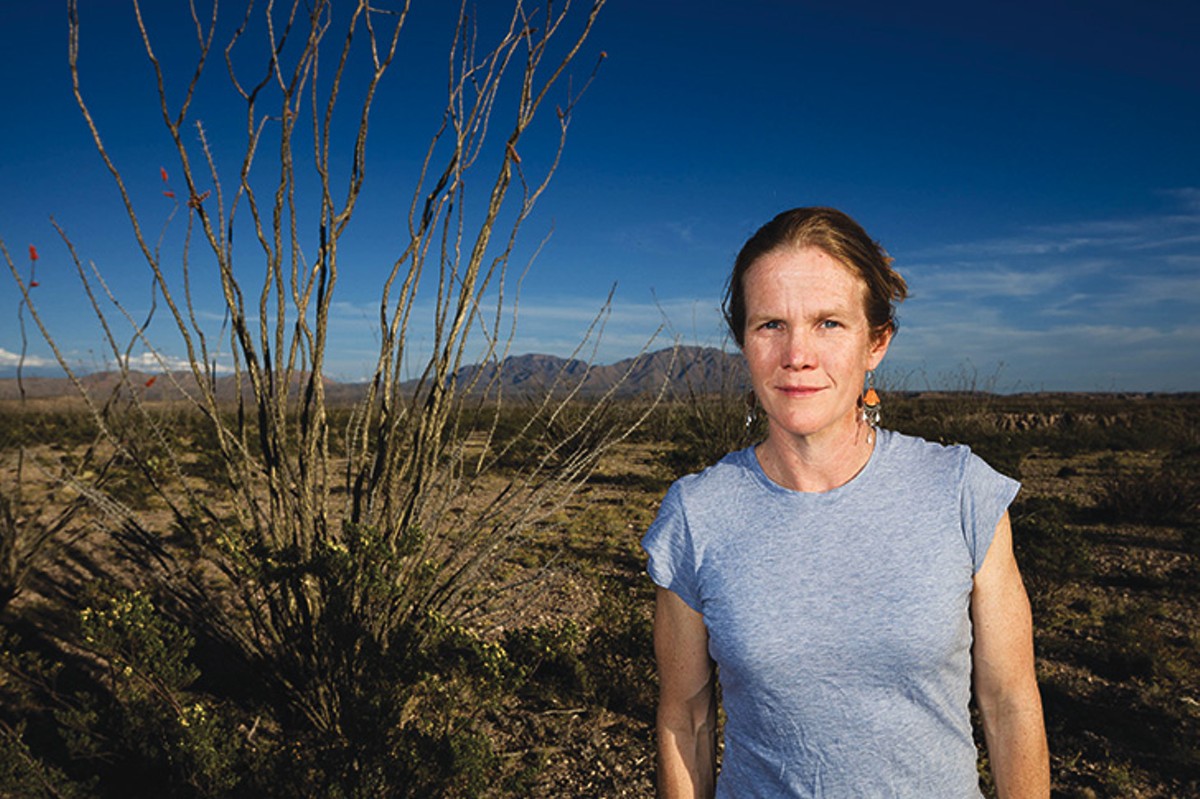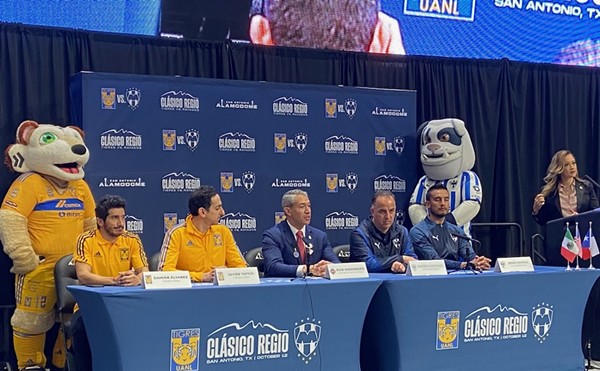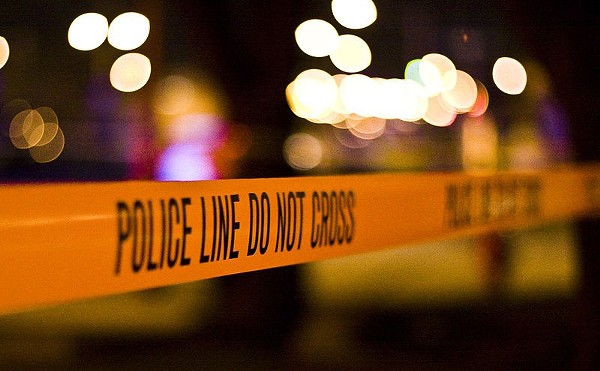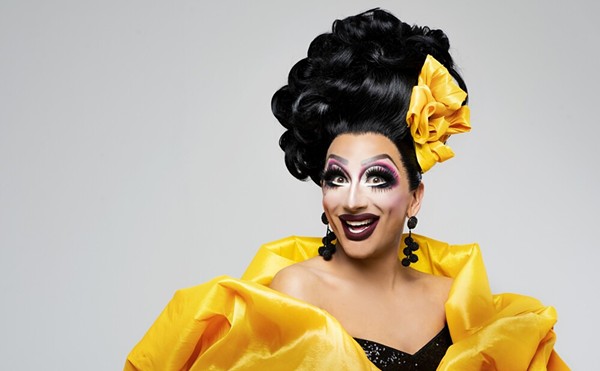Jenny Browne moved to San Antonio on New Year’s Day, 1997. It was the same day that singer-songwriter Townes Van Zandt, another Texas poet, died.
She thought she’d spend a year in the city, then move on. But fast forward about 20 years, and Browne is still here — writing, teaching at Trinity University, diving deep into different community initiatives and, soon, acting as San Antonio’s official poet.
The City of San Antonio announced on March 14 that Browne would be San Antonio’s poet laureate for 2016-2018, following Carmen Tafolla and Laurie Ann Guerrero.
Browne spoke with the San Antonio Current last week via phone about her new gig, and how San Antonio finds its way into her writing. She was in far West Texas, spending Spring Break amid the mountains and rivers of the border and painting ocotillos in watercolor.
This interview has been edited for clarity and length.
How much was this on your radar? Was it something you expected, or did it pop out of the blue?
Three years ago when Mayor Castro announced that San Antonio was going to have a poet laureate, I actually read a poem at the press conference. … I think I said and meant it in their press release that I’m thrilled as an individual, but San Antonio making this an official thing says a lot about the city’s spirit and interests and commitment to poetry. So I knew about it.
Over the years people have asked if they could nominate me. I actually said “no,” [in years past] in part because the first year I felt like ... I wasn’t sure that I would be a good person. I think of this idea of a “laureate,” maybe I thought I needed to be older. It sounded sort of statesperson-like.
I was thrilled that Carmen Tafolla was the first laureate, and I think that’s someone who has been so deeply involved in the cultural voices of San Antonio for such a long time, that I think that was a great pick.
It had been on my radar, and when people have asked if they could nominate me I hesitated because I feel like it’s a big deal. I feel like it’s important and I wanted to be able to commit myself and my energies to it, so this year when several people asked, I said “OK, sure.”
I guess it took a little convincing. But a number of people said to me “The stuff that you’ve been doing in San Antonio for 20 years now is what this is.” Educating people, doing events surrounding poetry.
When you think about how you would like to use this position, is there anything that springs to mind right off the bat?
I think one of the things about poetry and literature in general is the way that it is both at its core an internal and solitary practice. … For me, in my own poetry practice, I’ve been getting up every day before the sun for 20 years trying to say something. Trying to make sense of my own experience. So it’s also interesting then to think about how that practice can be turned outward.
I do have some ideas. One of them is explicitly connected to thinking about how we look at San Antonio as a physical landscape, as an ecosystem. My own work, both as a poet and as an educator over the past few years has become more focused on thinking about ecology and poetry and how those worlds intersect. I’ve been teaching for the past couple summers in a field school that Trinity has out in western Colorado. So collaborating with geologists and ecologists, and helping students articulate their relationship to their environment. We think about environment as traditional nature poems, but I think one of the questions now is can you still write a nature poem?
But it seems harder and harder to find a place that isn’t evidently impacted by human contact. So I guess that’s a long way of saying I’m interested in thinking about and finding ways for other poets, and people who maybe don’t even think of themselves as poets, to focus their attention and their language on what their specific relationship is to the environment of San Antonio. Because environment just means what’s around you. I think the West Side of San Antonio is a very particular environment. I think the suburbs of San Antonio, the military bases are particular environments. I’m not sure what that’s going to look like.
I’m kind of interested in how we might incorporate poetry into the built environment. But also really finding ways how we can work with people ... to really look at their environment in this city. We’re a city that’s built around water and on top of water. We’re a city that’s hot and is only getting hotter. And I think it’s an interesting time to figure out what it means to be both a human and a writer at a time when I think we can generally agree that we are facing increasing environmental crises. And you start asking those questions, and they’re related to questions of class, they're related to questions of race, they’re related to questions of what it takes to have a nice green lawn, and what it takes to live in a high-density place.
In this role, Do you see yourself as more as an ambassador for the city or an interpreter of the city? Or are you in some ways both?
My understanding is that I’m both. I am both expected to speak for the city in an official capacity as the city’s poet. But also something of an interpreter in that hopefully finding ways to use poetry to make evident other voices in the city, be they young people, be they other poets.What are the physical places in San Antonio that your mind is drawn to during the writing process, or where you’re most prolific?
I live right near the bridge at Eagleland, right by Brackenridge High School on the southern edge of Downtown. I walk the Mission Reach of the river every day. Sometimes twice a day. And for me, that place is sort of emblematic of the questions I’m asking because it is a natural river. This idea that I’m getting out in nature. But it is also right up juxtaposed against the commercial life of San Antonio, the history of San Antonio. You're walking down to the missions but you’re also walking past a lot of industry. There’s a golf course, there’s an RV park. And for me, that’s what I'm interested in. When I'm walking, I’m interested in poems that have lots of registers and lots of juxtapositions, because that’s how I experience the world. I guess I just don’t buy the sort of bucolic, romantic, capital “R” anymore of the natural world as a symbol for my musings.I’m actually interested in kind of naming the world, as precisely and honestly as I can, what the world actually looks like right now. So I take that walk, and that’s where both my mind wanders — to make a bad metaphor, like a river — and walking is where I can let thoughts come in, but it’s also where I observe different voices, different stories. There are stories. There are people on bikes, there are overpasses. You’re literally surrounded by the sounds of cars and the sounds of the river at the same time. I walk that part of the river and that’s ... where a lot of my thinking toward poems starts.
Using that technique to draw out material, is that something you’ve done habitually or something you’ve developed over time?
I have always found that my best thinking happens when I’m walking. And therefore I think my best writing happens even if I’m not writing when I’m walking. ... I don’t listen to music or anything but I take my phone and often lines will come, and they come with the rhythm of walking. I don’t think it’s an accident. I do think that poetry, I tell my students, is the one kind of literature where how you say something is as important as what you say. So engaging your body in that process, in the process of literally moving through the landscape means that you’re engaging in a rhythm. William Stafford said if you can breathe you’re in the rhythm business. And that’s sort of what, at the core, I'm also of thinking about.
How do those experiences color your work? Can you see traces of that former life in what you’re doing now?
Well, yeah. I think that poetry runs the risk of being kind of rarefied. … I think that for me, I’ve always been interested in writing poems that could be accessible to the range of people that my life put me in contact with. Whether it’s my uncles who are still farmers back in Indiana, or the guys who were sitting at the bar at La Tuna. ... If a poem doesn’t show someone a world that they can at least somewhat recognize, then I think it’s not doing all it can do. It doesn’t mean you have to relate to the particular details of someone else’s life. But I’ve always been interested in how to make a poem that reflected something of the chance and unexpected nature of my own life, of kind of just following your gut a little bit. I didn’t plan on working at a bar in Downtown San Antonio and being told really good stories.
We talk about this thing like finding your voice, and I think that can be mistakenly meant to sort of be excessively self-referential. I’m interested in making a world in a poem that has room for a range of voices, because I’ve always been interested in being in worlds that have a range of voices and experiences. So I hope so. The short answer is I hope so.
Do you see part of this job as an opportunity to chip away that “rarefied” veneer and try to bring more people to poetry?
I think so. I think that people are scared, too, by poetry. And sometimes they have reason to be. There’s a really destructive school of teaching poetry that suggests that if you’re not smart enough to figure out the hidden meaning of this maze, then poetry’s not for you. And I would wholly disagree with that orientation on poems. I do think it is part of my job to both introduce people to the mystery of poetry, but also demystify it. That is something I’ve been doing, teaching literature in community centers and jails and libraries and schools.
For me, I think when I was 19, 20 [years old] and starting to be out in the world, to find a poem that was written by someone from a different century that said something about the world that felt true, emotionally true, that’s all that a poem needs to do. It doesn’t need to be this puzzle. … Whatever you find in a poem is what you need to find. I think it does circle back to one of the things I tell my students, is that the less we can talk about how we feel and the more we can talk about the places, experiences, people, questions, mistakes, mountains, that made us feel those things, the more we’re actually speaking a language that anybody can find something meaningful in.
I hope there’s a sort of a curatorial role too, an opportunity to introduce people through different means. I’m not sure if that means giving readings or creating access. I think the previous poet laureates have done great stuff, whether it’s creating public forums or the archives and that sort of thing. … I hope to both have the opportunity to share what has always been life-giving about poetry to me. And also help people who maybe haven’t had that experience find some new doors.















